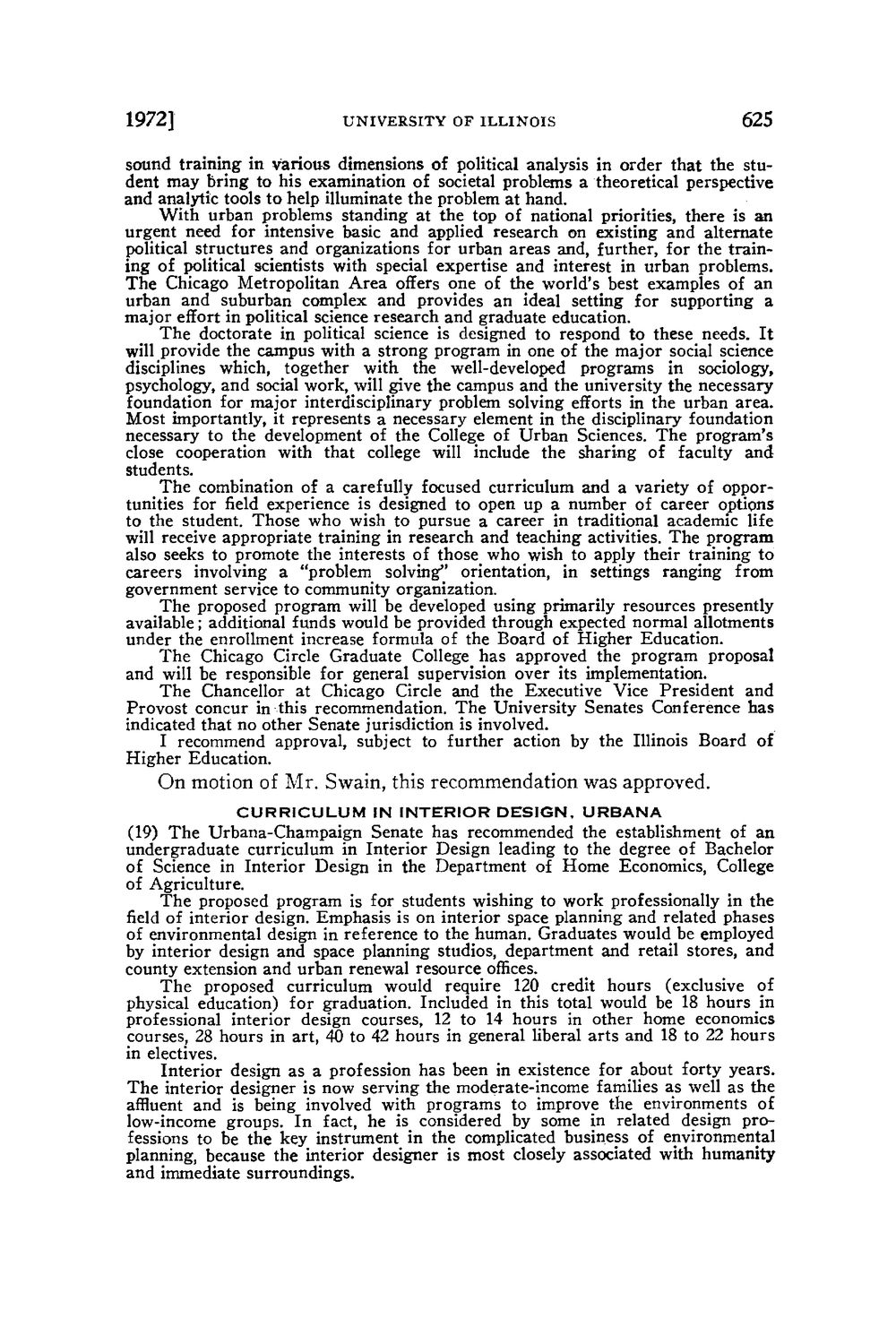| |
| |
Caption: Board of Trustees Minutes - 1972
This is a reduced-resolution page image for fast online browsing.

EXTRACTED TEXT FROM PAGE:
1972] UNIVERSITY OF ILLINOIS 625 sound training in various dimensions of political analysis in order that the student may bring to his examination of societal problems a theoretical perspective and analytic tools to help illuminate the problem at hand. With urban problems standing at the top of national priorities, there is an urgent need for intensive basic and applied research on existing and alternate political structures and organizations for urban areas and, further, for the training of political scientists with special expertise and interest in urban problems. The Chicago Metropolitan Area offers one of the world's best examples of an urban and suburban complex and provides an ideal setting for supporting a major effort in political science research and graduate education. The doctorate in political science is designed to respond to these needs. It will provide the campus with a strong program in one of the major social science disciplines which, together with the well-developed programs in sociology, psychology, and social work, will give the campus and the university the necessary foundation for major interdisciplinary problem solving efforts in the urban area. Most importantly, it represents a necessary element in the disciplinary foundation necessary to the development of the College of Urban Sciences. The program's close cooperation with that college will include the sharing of faculty and students. The combination of a carefully focused curriculum and a variety of opportunities for field experience is designed to open up a number of career options to the student. Those who wish to pursue a career in traditional academic life will receive appropriate training in research and teaching activities. The program also seeks to promote the interests of those who wish to apply their training to careers involving a "problem solving" orientation, in settings ranging from government service to community organization. The proposed program will be developed using primarily resources presently available; additional funds would be provided through expected normal allotments under the enrollment increase formula of the Board of Higher Education. The Chicago Circle Graduate College has approved the program proposal and will be responsible for general supervision over its implementation. The Chancellor at Chicago Circle and the Executive Vice President and Provost concur in this recommendation. The University Senates Conference has indicated that no other Senate jurisdiction is involved. I recommend approval, subject to further action by the Illinois Board of Higher Education. On motion of Mr. Swain, this recommendation was approved. C U R R I C U L U M IN INTERIOR DESIGN. URBANA (19) The Urbana-Champaign Senate has recommended the establishment of an undergraduate curriculum in Interior Design leading to the degree of Bachelor of Science in Interior Design in the Department of Home Economics, College of Agriculture. The proposed program is for students wishing to work professionally in the field of interior design. Emphasis is on interior space planning and related phases of environmental design in reference to the human. Graduates would be employed by interior design and space planning studios, department and retail stores, and county extension and urban renewal resource offices. The proposed curriculum would require 120 credit hours (exclusive of physical education) for graduation. Included in this total would be 18 hours in professional interior design courses, 12 to 14 hours in other home economics courses, 28 hours in art, 40 to 42 hours in general liberal arts and 18 to 22 hours in electives. Interior design as a profession has been in existence for about forty years. The interior designer is now serving the moderate-income families as well as the affluent and is being involved with programs to improve the environments of low-income groups. In fact, he is considered by some in related design professions to be the key instrument in the complicated business of environmental planning, because the interior designer is most closely associated with humanity and immediate surroundings.
| |